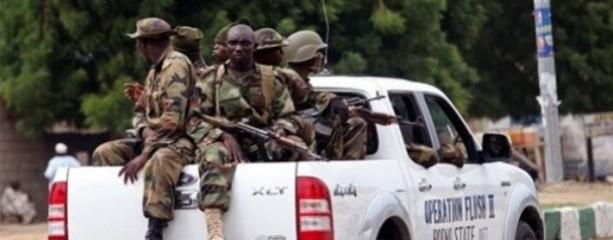Alison Des Forges
 Last Thursday night, we lost an outspoken and cherished activist, analyst, and friend, and a “most valuable player” of the Great Lakes family of analysts. Alison’s colleagues and friends in Africa, the United States, and in Europe cannot shake the irony that she survived war zones and patched-up Antonovs in remote locations of the globe, and was taken from us on a short, routine flight home to upstate New York, a flight she has taken countless times.
Last Thursday night, we lost an outspoken and cherished activist, analyst, and friend, and a “most valuable player” of the Great Lakes family of analysts. Alison’s colleagues and friends in Africa, the United States, and in Europe cannot shake the irony that she survived war zones and patched-up Antonovs in remote locations of the globe, and was taken from us on a short, routine flight home to upstate New York, a flight she has taken countless times.
Alison was that rare breed of analyst who moves easily from university lecture halls, to high-level policy meetings, to modest hostels in the field, with the same unpretentiousness that she brought home to Buffalo. She had a kind grandmotherly smile that invited nervous first-year graduate students to approach her, and a devilish twinkle in her eye that always made me think that she had something really good up her sleeve that would win her the argument at just the right moment. In the last 48 hours of email disbelief, countless colleagues and friends have recounted how she helped launch their career or introduced them to the Great Lakes. My 20-something year old program assistant who’s mulling over graduate and field work in the Great Lakes and to whom I introduced Alison a couple of months ago, exclaimed in an email, “But she has been a role model for me!”
Alison, who cut her professional teeth on chronicling, analyzing, and speaking out about the 1994 Rwanda genocide, did not hesitate to speak out against the growing political repression and alarming authoritarian tendencies shown by the Rwandan government in recent years. This did not earn her points in Kigali””in fact, once the darling of the Rwandan government, in recent years she was banned from entering the country. Unlike so many Western analysts who entered the Great Lakes region through the Rwanda genocide and who today insist that President Kagame can do no wrong, Alison’s lenses remained clear and sharp. While others became Kigali’s apologists, Alison spoke out loudly against Rwandan aggression in the region and repression at home. It is rare for an analyst to give up that kind of access for principle.
Today, with Rwandan and Ugandan troops back in the DRC in what many of us see as a back to the future of 1998 moment, Alison’s sharp analysis and outspoken voice will be sorely missed. But she has taught us that good research and solid activism can and should be linked. And that we must hold even our friends to account, as we should hold ourselves. It is now our job to pick up where Alison left off.







Â
I just heard that Alison Des Forges, one of the leading world experts on Rwanda, tragically died in a plane crash last night. This is very sad news to her many colleagues and friends around the world, as well as to the many Rwandans, Congolese and others in Central Africa, whom she helped and supported over the years. Alison was an outstanding and passionate human rights advocate who dedicated her life to working on Rwanda. She is known as one of the few people who desperately tried to attract the world’s attention to the preparation of the Rwandan genocide, and then worked tirelessly to document it, as well as to tell the story of the victims and bring the perpetrators to justice. In this region of Central Africa, where so many myths circulate, she spent many years of her life uncovering the truth, writing the most authoritative account of the genocide and testifying in front of various legal and political bodies in the US, Europe and Africa. She is also one of the precious few who also advocated that the rebel Rwandan Patriotic Front should be held to account for their crimes, including the murder of some 30,000 people during and just after the genocide, and atrocities committed in the Democratic Republic of the Congo.Â
Â
Her commitment, her intellectual rigor, and her generosity was and will remain an inspiration for so many of her colleagues in this field. Â
I spoke with Alison just two days before the tragedy. She was in London, where she was attending a Commonwealth meeting that was debating Rwanda’s candidature to join the organization. It was 730 in London, but Alison was chipper and energetic as usual. It was a typical conversation: she wanted to know what I thought about developments in the eastern Congo, and we traded gossip and analysis on how Laurent Nkunda’s arrest had affected the RPF in Kigali. As always, she confounded me with anecdotes about Rwandan officials (whose genealogy she seemed to have down pat) whose names I was too embarrassed to reveal I barely recognized. As always, she was witty, dedicated, unsparing in her criticism for the both the Rwandan government as well as the FDLR and just simply Alison.
It has been said many times on the blogosphere in the past two days: Alison was an inspiration. While we often lose perspective and can sometimes lapse into the role of mechanical bureaucrat, Alison always seemed to have her moral compass on track, fully in line with her research.
She was unwavering in her criticism of injustice wherever she saw it, which led her to fastidiously chronicle the horrors of the genocide (it took her five years to complete her magnificent study, Leave No One To Tell the Story), but also made her one of the the foremost critics of the RPF government. I met her in Burundi in September, just before she was refused entry to Rwanda to follow the elections. Then, several months later she was immediately deported by immigration officials, who didn’t let her disembark from a plane in Kigali. Shortly afterwards, she was officially banned from entering Rwanda, but no official reason was given. In a conference in Kigali last year, she was even accused as supporting genocide ideology by government officials. The irony is biting.
I will sorely miss Alison – in the blooming eulogies across the internet, it is becoming clear that she was a mentor and role model not just to me, but to dozens of people.
In memoriam,
Jason Stearns
Nairobi
I was deeply fortunate to know and work with Alison for a brief period, while I was still a college student attempting to chart a path for my future. I worked with her at Human Rights Watch, Africa during the period of the Rwandan genocide. To this day I remember a piece of her writing so singular that it left a deep impression on the national debate at that time and so forceful that it continues to leap into my thoughts unbidden with surprising frequency.
The article was a description of a chilling phone call Alison had with her friend and colleague Monique Mujawamariyaw, during which gunshots from summary executions rang in the background, the killers coming closer to the house in which Monique was living. Finally, Monique indicated that the men were next door and she was next. She hung up and Alison documented her death, only to find several days later that Monique had been hiding in the ceiling for days and managed to escape. The story told by Alison and the way she presented this astonishing tale transformed both the national debate and the global response to Rwanda. She was able to mobilize people in ways that I’ve never since encountered, and not only by dint of the tugging stories she shared: she was always fact-based, presenting massive amounts of material and analysis, she was fair minded, and she was deeply caring.